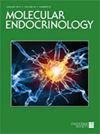Flavin-Containing Monooxygenase 3 Reduces Endoplasmic Reticulum Stress in Lipid-Treated Hepatocytes.
Q Biochemistry, Genetics and Molecular Biology
引用次数: 11
Abstract
Isoforms of flavin-containing monooxygenase (FMO) are involved in xenobiotic metabolism but have also been implicated in the regulation of glucose and lipid homeostasis and in the development of atherosclerosis. However, we have recently shown that improved insulin action is associated with increased FMO expression in livers of protein kinase C-deficient mice. Here, we investigated whether FMO3 expression affected insulin signaling, glucose metabolism, and endoplasmic reticulum (ER) stress in hepatocytes. HepG2 and IHH hepatocytes were transfected with FMO3 cDNA for overexpression, or small interfering RNA for knockdown. Cells were treated with palmitate to induce insulin resistance and insulin signaling, phosphoenolpyruvate carboxykinase (PEPCK) gene expression and ER stress markers were examined by immunoblotting and RT-PCR. Glycogen synthesis was measured using [(14)C]glucose. Palmitate treatment reduced insulin signaling at the level of Akt phosphorylation and glycogen synthesis, which were little affected by FMO3 overexpression. However, the fatty acid also increased the levels of several ER stress markers and activation of caspase 3, which were counteracted by FMO3 overexpression and exacerbated by FMO3 knockdown. Although FMO3 expression did not reverse lipid effects on protein thiol redox in hepatocytes, it did prevent up-regulation of the gluconeogenic enzyme PEPCK by pharmacological ER stress inducers or by palmitate. ER stress and PEPCK levels were also reduced in livers of fat-fed protein kinase Cδ-deficient mice. Our data indicate that FMO3 can contribute to the regulation of glucose metabolism in the liver by reducing lipid-induced ER stress and the expression of PEPCK, independently of insulin signal transduction.含黄素单加氧酶3降低脂质处理肝细胞内质网应激。
含黄素单加氧酶(FMO)的异构体参与了异种代谢,但也参与了葡萄糖和脂质稳态的调节以及动脉粥样硬化的发展。然而,我们最近发现胰岛素作用的改善与蛋白激酶c缺陷小鼠肝脏中FMO表达的增加有关。在这里,我们研究了FMO3的表达是否影响肝细胞中的胰岛素信号、葡萄糖代谢和内质网(ER)应激。用FMO3 cDNA转染HepG2和IHH肝细胞进行过表达,或用小干扰RNA进行敲低。用棕榈酸处理细胞诱导胰岛素抵抗和胰岛素信号传导,免疫印迹和RT-PCR检测磷酸烯醇丙酮酸羧激酶(PEPCK)基因表达和内质网应激标志物。糖原合成用[(14)C]葡萄糖测定。棕榈酸盐处理降低了Akt磷酸化和糖原合成水平的胰岛素信号,而FMO3过表达对这些水平的影响很小。然而,脂肪酸也增加了几种内质网应激标志物的水平和caspase 3的激活,这些被FMO3过表达抵消,并被FMO3敲低加剧。虽然FMO3的表达并不能逆转肝细胞中脂质对蛋白质硫醇氧化还原的影响,但它确实可以阻止内质酰胺应激诱导性药物或棕榈酸盐上调糖异生酶PEPCK。脂肪喂养的蛋白激酶c δ缺乏小鼠肝脏内质网应激和PEPCK水平也降低。我们的数据表明,FMO3可以独立于胰岛素信号转导,通过降低脂质诱导的内质网应激和PEPCK的表达,参与肝脏葡萄糖代谢的调节。
本文章由计算机程序翻译,如有差异,请以英文原文为准。
求助全文
约1分钟内获得全文
求助全文
来源期刊

Molecular endocrinology
医学-内分泌学与代谢
CiteScore
3.49
自引率
0.00%
发文量
0
审稿时长
12 months
期刊介绍:
Molecular Endocrinology provides a forum for papers devoted to describing molecular mechanisms by which hormones and related compounds regulate function. It has quickly achieved a reputation as a high visibility journal with very rapid communication of cutting edge science: the average turnaround time is 28 days from manuscript receipt to first decision, and accepted manuscripts are published online within a week through Rapid Electronic Publication. In the 2008 Journal Citation Report, Molecular Endocrinology is ranked 16th out of 93 journals in the Endocrinology and Metabolism category, with an Impact Factor of 5.389.
 求助内容:
求助内容: 应助结果提醒方式:
应助结果提醒方式:


